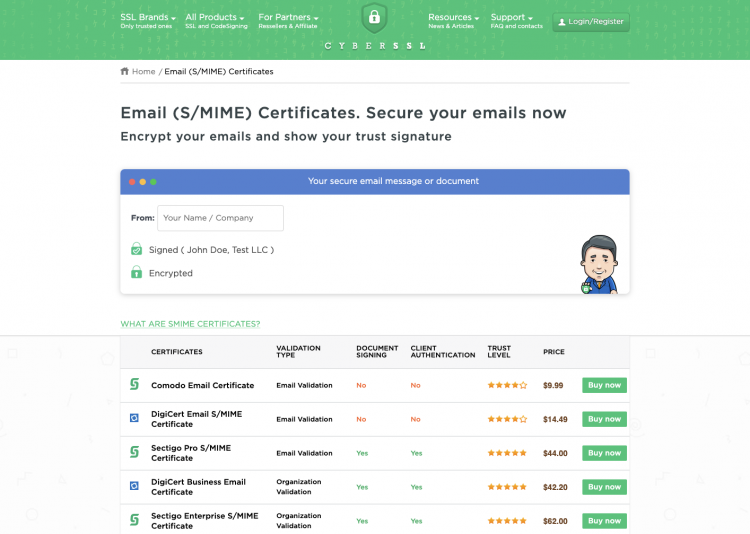Email may be convenient, but is your business communication truly secure? Standard email lacks encryption safeguards leaving messages vulnerable to interception and hacking. This exposes confidential company data sent over email.
To lock down email security, businesses today urgently need S/MIME certificates according to leading cyber security experts.
What Are S/MIME Certificates?
S/MIME (Secure/Multipurpose Internet Mail Extensions) certificates utilize cutting-edge cryptography to encrypt and digitally sign emails. S/MIME provides:
- Email encryption to prevent unauthorized access to message contents during transmission. This blocks data breaches.
- Digital signatures that authenticate the sender’s identity. This prevents harmful spoofing, phishing and fraud.
- Tamper evidence so any changes invalidate the signature, proving the email was modified. This ensures integrity.
- Non-repudiation or undeniable proof of an email’s origin and delivery. This has legal implications.
S/MIME certificates are issued by trusted Certificate Authorities (CAs) like Comodo, DigiCert, Sectigo, and GlobalSign. The CA validates the applicant’s identity and issues a certificate binding their credentials to their public key used for encryption and signing.
Why Securing Your Email is Absolutely Critical for Any Business
Email may seem harmless, but lacking proper security it is a gateway for cyber threats and legal liability for businesses today.
Experts strongly advise all companies implement S/MIME certificate email encryption to mitigate risks like:
Rampant Email Hacking
- Over 269 billion emails are sent daily – it’s impossible to fully secure this massive volume. Account takeovers and hacking are common.
- Intercepted unencrypted emails allow cyber criminals easy access to sensitive company data and trade secrets. This leads to devastating data breaches.
- Employees often reuse passwords across accounts. Hacking one email account can domino into compromising critical systems.
Costly Phishing Attacks
- Phishing schemes cost businesses over $20 billion per year in losses to fraud, stolen data, and reputational damage.
- Spoofed emails impersonate trusted brands in phishing scams. S/MIME signatures prevent this by validating senders.
- Infected attachments and links in phishing emails spread malware within an organization. Encryption contains the threat.
Strict Industry Regulations
- Regulations like HIPAA and PCI DSS mandate encrypting protected health information, financial data, and other confidential information transmitted via email.
- Failure to comply with email encryption requirements results in heavy fines and loss of operating licenses.
Destroyed Customer Trust
- Data breaches due to unsecured email lead to customers permanently losing trust in a brand if their information is exposed.
- Encryption shows customers you take their data privacy seriously and restores confidence after a breach.
Legally Binding Agreements
- Many business agreements and contracts are conducted over email. These require non-repudiation to be legally binding.
- S/MIME signatures irrefutably prove the origins and delivery of emails, satisfying e-signature legal requirements.
Protection of Trade Secrets
- Intellectual property, competitive insights, engineering designs, strategy plans and other trade secrets require protection if exchanged over emails.
- Encryption ensures only intended recipients can access sensitive trade secret information sent via email.
Clearly, comprehensive email security is essential for compliance, risk reduction, and preserving customer trust.
The risks of unsecured email for businesses are enormous from data breaches to phishing to regulatory non-compliance, according to CyberSSL.com S/MIME certificates mitigate these threats.
How To Set Up S/MIME Email Security For Your Business
Leading experts like CyberSSL.com recommend following these simple steps to get robust S/MIME protection for your company email:
Step 1: Get S/MIME Certificates
First, obtain S/MIME certificates from a trusted certificate authority (CA) like Comodo, DigiCert, or GlobalSign. CyberSSL.com offers certificates from all the top providers.
Step 2: Generate Keys
Next, generate a public/private key pair and Certificate Signing Request (CSR) on your systems. This contains your public key to submit to the CA.
Step 3: Install Certificates
Once issued, install the S/MIME certificates on all corporate devices and email clients that will use encrypted email. This allows employees to access certificates.
Step 4: Configure Email Clients
Now enable S/MIME encryption in your email client settings like Microsoft Outlook. Select the installed certificate for signing and encryption.
Step 5: Start Sending Secure Emails
That’s it! You can now begin sending S/MIME encrypted emails between configured clients. Only recipients with the right private key can decrypt and read the messages.
With these simple steps, your company email is now secured with powerful S/MIME encryption.
For affordable S/MIME certificates with strong 2048-bit encryption and comprehensive support, CyberSSL.com is the premier choice for businesses. Protect your mission-critical communications today!





